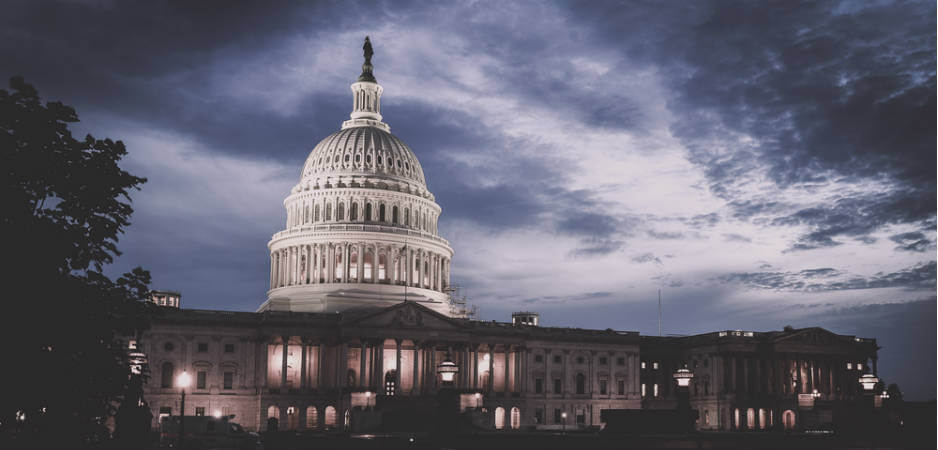In this edition of The Interview, Fair Observer talks to former US ambassador David D. Pearce.
President Donald Trump’s “America First” policy has been met with criticism both at home and abroad, not only for its perceived protectionism on economic issues, but also for heralding a new era of American isolationism in international affairs. The US has stepped back from multilateral accords like the Paris Climate Agreement and announced a $285-million funding cut to the UN budget. Albeit US commitment to NATO was reconfirmed to be “ironclad,” President Trump’s skepticism toward the alliance has created a sense of unease. Adversaries like Russia have been emboldened, carving out new spheres of influence. Time-honored friends and partners wonder where they stand.
Nowhere is this uncertainty about America’s place on the global stage, as well as the perception that the US is stepping back from its leadership role, felt more acutely than in the halls of the US Department of State. Here, the Trump administration has proposed major funding cuts and instituted a hiring freeze, leaving many of the senior positions unfilled. This marginalization and hollowing-out of the institution on the frontlines of American diplomacy has, in turn, led to declining morale and a drastic mass exodus of career diplomats.
Meanwhile, President Trump has kept up his attack on another major American institution: the media. This tension comes in tandem with a broader crisis of credibility for mainstream outlets as traditional news competes with proliferating social networks for consumers’ attention.
In this edition of The Interview, Fair Observer talks to David D. Pearce, a career diplomat and former US ambassador to Greece and Algeria, about the importance of maintaining diplomatic partnerships, commitment to civic duty and how a changing media landscape is affecting democracy.
Athanasios Dimadis: The strategic question that has come into focus over the past year is whether US foreign policy should maintain its high level of engagement with other countries around the world, or whether it should step back from its leadership role. What is your view on what the role of US foreign policy should be in the 21st century?
David D. Pearce: There’s been a lot of talk in the past year about this, and especially about the role of the State Department, where I worked for nearly 35 years. Some wonder to what extent we even need diplomats in this day and age. You will not be surprised to hear I firmly believe that US engagement abroad is vital to our national defense, prosperity and security.
Let me cite two bits of history, one old, one more recent. First, the story of the hair of Muawiyah: The Umayyad Caliph Muawiyah was one of the top generals of the Prophet Muhammad. In the 7th century he ruled over famously fractious Syria for 40 years without discord, first as governor, and then as the leader of a Damascus-based empire that stretched from Spain to India. He was once asked how he managed to do this. “If there were but a hair between me and the others,” he replied, “I would not cut it. If they let go a little, I will pull. If they pull, I will let go a little.” The moral of the story for the wise leader or administrator is: stay engaged, avoid complete ruptures with your adversaries and adjust methods as circumstances require.
The second example is World War I: Last year was the 100th anniversary of our entry into the Great War. When it was over, there was a new world order, a new Middle East, and the US had emerged on the world stage as a global power. Except we didn’t want to be — we refused to ratify the postwar treaties or even join the League of Nations. We wanted to turn our backs on entangling alliances and overseas commitments and go back to the way we were. Over the next 20 years, as we turned away, we saw the rise of Nazi Germany in Europe and Japanese aggression in the Pacific. The upshot was that in World War II my dad went off to fight a war in Europe in the very same places where his father and my other grandfather had both fought, just a generation before.
The lesson is, we need to be engaged in the world, not as a favor to others, but because it is in our national interest to do so. We keep that hair of Muawiyah in place to advance our interests and to safeguard our national security.
Dimadis: Many Americans I meet seem to think that, because of US dominance, other countries need America more than America needs them. How important is it for the US to tend to its relationships with its friends and allies?
Pearce: Well, that is the lesson of World War I, and of World War II. We need allies and partners. Our allies and partners need us. NATO has kept the peace in Europe for over 70 years. But, like a garden, important relationships need tending, and nothing good happens if they are neglected. You need to show up at a senior level, listen and consult. When I was the US ambassador to Algeria and to Greece, I put a very high priority on getting senior administration officials to visit and engage with the Algerian and Greek leaderships. It’s not a one-way street. You don’t just come when you need something. You have to build relations when you don’t need people so they’re there when you do.
A little humility goes a long way. We need to recognize what we know and what we don’t know. No matter how good you think your information or intelligence is, chances are the people who actually live in a region know a heck of a lot more about it than you do. So you talk with your partners. You listen. If you want them in on the landing, you’d better have them in on the take-off. It’s really just common sense. Good business. You don’t take friends for granted. You tend the garden, and that constant gardening is diplomacy.
Dimadis: You joined the Foreign Service in January 1982, meaning you have seen many changes. What would your message be to those, especially from the younger generation, who aspire to a career in public service?
Pearce: We need the best candidates possible for our national security work, whether it’s the Foreign Service, or the military, or the CIA, or the Agency for International Development, or the Foreign Agricultural Service, or the Foreign Commercial Service, or the Treasury Department, or the Justice Department or the various law enforcement agencies that maintain important liaison relationships abroad. So whenever I am asked to make some remarks or do an interview, I always make a pitch for public service, and for the Foreign Service in particular. It is critically important that we enlist our most talented to learn the hard languages, go to the hard places and do the hard things.
Dimadis: What is the meaning of public service today?
Pearce: I don’t think the essential meaning of public service changes much over time. To me, it means a strong sense of duty, discipline and service above self. I know of no greater honor than to serve and represent one’s country overseas. Most of us want lives of meaning. There are lots of ways to do that, but public service is one of the very best.
Dimadis: Some people don’t know that before becoming a diplomat and US ambassador, you had a career in journalism with The Washington Post and Associated Press. From your perspective as a former journalist, how do you understand the significant structural changes that have taken place in the media landscape over about the last 20 years?
Pearce: When I began my career as a reporter in the early 1970s, there was no Facebook, no cell phones, no cable TV, no internet and no email. Long-distance telephone calls were very expensive. The reporting of international news in the United States was dominated by the two major wire services, a few large metropolitan newspapers, the weekly news magazines TIME and Newsweek and three national broadcast networks. Most of these organizations maintained networks of correspondents and news bureaus overseas. Foreign correspondents generally filed their reports by Telex. Computers were just beginning to appear on the scene, but they were large and clunky and used mainly for word processing and data storage.
By the time I wrote my book, Wary Partners, about 20 years later, the internet was well along on its march into the broad spaces of commerce. Email, cell phones and computers were coming into more general use, and personal devices were getting smaller and cheaper by the year. CNN’s live coverage of the 1990-91 Iraqi invasion of Kuwait and its aftermath signaled a profound challenge to the old journalistic order, bringing world events to consumers in real time.
As the media scene changed, advertising revenues also shifted in new directions. Traditional revenue structures came under increasing stress, and major media outlets began to rethink the way they covered the international news. Organizations cut back on expensive overseas bureaus. The result: more “parachute” coverage of events by journalists and instant experts, less expertise and analytical input from regionally-based foreign correspondents.
Dimadis: I was impressed by your prescience in Wary Partners, written 23 years ago: “The fast-evolving communications and technology revolutionizing nearly every aspect of international relations are also reshaping the way governments do business with one another. In this whirlwind of change, it is plain that more information than ever will be available to publics in the twenty-first century and that this will profoundly affect the conduct of international affairs. Not only will information media and technology play a central role in the shaping of public policy, but the efficacy of diplomacy as a tool of policy will depend to a large extent on how well diplomats adapt to this reality.” Do you have any concerns about the way information is disseminated and consumed today through social media?
Pearce: In the years since I wrote that, these trends have accelerated. What I regret most is the decline of editing, and especially the blurring of the formally sacred distinction between news coverage and editorial opinion. I have always taken it as an article of faith that the quality of a news organization’s product is a direct function of the quality of its editing. But the atomization of information via social media effectively means that there are now comparatively fewer real gatekeepers to safeguard the quality and accuracy of what the general public sees and hears. Today’s readers and listeners pick and choose information from a broad, ever-proliferating, à la carte menu of outlets vying for their attention. And in many respects, this luxury of choice is a tremendous advance. But in the marketplace of ideas, it also allows people, if they are so inclined, to hear and see only what they like. Short form, social media and multitasking are up; long form, print media and reading are down.
Dimadis: Is the displacement of the old-format media and press by online and social media a positive development for the industry, the consumers and, more broadly, for democracy itself?
Pearce: Many will argue that this is a good thing. Not me. I own a 1972 book on news editing by Bruce Westley of the University of Kentucky. Its definition of the role of the individual copy editor seems almost quaint by today’s standards. It says the copy editor must eliminate errors in spelling, grammar, sentence structure, style, taste, fact and organization. In addition, the editor must guard against unwarranted reportorial bias, verbosity, repetition, wearisome detail, overlooked facts, incongruities, advertising in disguise, libel, lottery, hoaxes, old news, axe-grinding and duplication. News organizations and decision-makers alike must now contend with a social media environment that has made everyone a reporter and everyone an editor.
The practical effect of this is to flatten and atomize distribution of information in a hurtling blend of fact, error and opinion. So the media landscape has been reshaped dramatically over the past three decades. This has had the effect of speeding up pressure on decision-makers, reducing the time for deliberation, delegitimizing authority figures and polarizing audiences — all of which hampers the kind of careful deliberation, compromise and accommodation that is essential for the effective functioning of democratic institutions.
The views expressed in this article are the author’s own and do not necessarily reflect Fair Observer’s editorial policy.
Photo Credit: Orhan Cam / Shutterstock.com
Support Fair Observer
We rely on your support for our independence, diversity and quality.
For more than 10 years, Fair Observer has been free, fair and independent. No billionaire owns us, no advertisers control us. We are a reader-supported nonprofit. Unlike many other publications, we keep our content free for readers regardless of where they live or whether they can afford to pay. We have no paywalls and no ads.
In the post-truth era of fake news, echo chambers and filter bubbles, we publish a plurality of perspectives from around the world. Anyone can publish with us, but everyone goes through a rigorous editorial process. So, you get fact-checked, well-reasoned content instead of noise.
We publish 2,500+ voices from 90+ countries. We also conduct education and training programs
on subjects ranging from digital media and journalism to writing and critical thinking. This
doesn’t come cheap. Servers, editors, trainers and web developers cost
money.
Please consider supporting us on a regular basis as a recurring donor or a
sustaining member.
Will you support FO’s journalism?
We rely on your support for our independence, diversity and quality.








